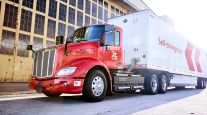Managing Editor, Features and Multimedia
Who’s Still In Autonomous Trucking?

[Find the latest in trucking technology: Explore this quarter's issue of iTECH]
The crowded field of developers in the autonomous truck space has winnowed during the past year as several startups and tech companies shut down or shifted their focus. Those that remain, however, are nearing driver-out milestones and continue to lay the foundation for large-scale industry adoption in the coming years.
While companies such as Waymo, TuSimple, Embark and Locomation are no longer actively developing self-driving trucks for the North American market, others see a clear path to commercial deployment.
Aurora co-founder and CEO Chris Urmson described 2024 as a “pivotal year” for the company, which plans to commercially launch its technology with about 20 fully autonomous trucks with no driver by the end of the year.
“This next year will be the one where the magic happens, where we go from telling the story of what automated vehicles will do for transportation to actually seeing and realizing it out in the world,” Urmson said in January during a panel discussion hosted by Aurora’s supplier partner Continental at CES.
While startups and tech companies are driving the development of autonomous driving technology, they are not going it alone.
This next year will be the one where the magic happens...
Aurora co-founder and CEO Chris Urmson
Image
Established industry players including truck makers, component suppliers, shippers, and trucking and logistics providers all have had a hand in shaping this technology and how it will be deployed.
Aurora, for one, has partnered with truck manufacturers Paccar Inc. and Volvo Trucks North America to integrate and eventually deploy its technology on those companies’ Class 8 truck models. Aurora also is working with global automotive supplier Continental to eventually mass produce the hardware components of its autonomous driving system, the Aurora Driver.
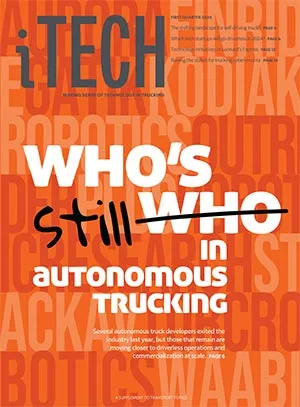
More Q1 iTECH
►Who's Still In Autonomous Trucking?
►Clevenger: Autonomous Trucking: A Rapidly Shifting Landscape
►Company snapshots: Aurora | Kodiak | Torc | Waabi | Stack AV | Gatik | Plus | Einride | Forterra | Outrider
►From November 2022: Who's Who in Self-Driving Truck Development
►Q and A: Chris DeMillo, Leonard's Express
►Dysart: New SEC Rules
Explore the Issue!
“We’ve built the company around partnerships, and we’ve seen that come to life,” Urmson said.
Kodiak Robotics also aims to begin operating autonomous trucks on public roads without a driver on board later this year.
“It’s a culmination of a lot of years’ work for many, many people,” Kodiak founder and CEO Don Burnette said. “When we finally go driverless it is going to be a very exciting day.”
The latest autonomous truck designs have advanced significantly since the early test vehicles introduced five to 10 years ago.
“When you look at the original trucks that we built, they were pretty rough — rough on the eyes, for sure,” Burnette said. “They were basically just prototypes to see what’s possible.”
Now companies such as Kodiak are introducing trucks with streamlined sensor arrays, new safety features and redundant systems necessary for driverless operation. At CES, Kodiak unveiled the truck design it plans to deploy in its initial driver-out runs.
After years of refining and validating their technology, developers are now paving the way for operational adoption, said autonomous trucking expert Lee White, president of LM White Consulting.
The next big step is figuring out the practical details of how to integrate the technology into the transportation industry.
“That’s what we’re going into for the next 36 months,” White said. “How are we going to adopt this technology? Where does it work? How does it work?”
After those early deployments take hold, the focus will turn to scaling up industry adoption, he added.
Industry Departures, Plus a Newcomer
Several pioneers in autonomous trucking ended, slowed down or redirected their development work in 2023, including some of the biggest names and early leaders in this space.
In July, Google sister company Waymo sidelined its autonomous trucking division, Waymo Via, to concentrate its efforts on its Waymo One robotaxi business, which currently offers rides in driverless passenger cars in several major cities.
TuSimple, once at the vanguard of autonomous truck development in North America, has been winding down its U.S. operations and shifting its attention to markets in the Asia-Pacific region after a series of setbacks. The company had conducted pilots with major U.S. fleets and demonstrated an unmanned autonomous truck run on public roads in Arizona in December 2021.
Another early player, Embark, was acquired in May by autonomous vehicle software firm Applied Intuition a few months after laying off the majority of its employees and announcing plans to shut down. Embark helped promulgate the hub-to-hub deployment model that has become the leading use case for autonomous truck development.
Locomation also closed down in 2023. The company had developed a system to electronically link a pair of trucks to form a driver-guided automated convoy.
These latest departures join several other autonomous businesses that previously ceased operations.
Ride-hailing company Uber Technologies ended its work on autonomous vehicle development when it sold its Advanced Technologies Group to Aurora in early 2021. Uber ATG included Otto, the self-driving truck startup it acquired in 2016.
Ike, another self-driving truck startup, was acquired in late 2020 by Nuro, which is developing unmanned local delivery vehicles instead of heavy-duty trucks.
Starsky Robotics, which shut down in 2020, had been developing remotely monitored autonomous trucks that could be controlled from afar by remote drivers when necessary.
Despite this growing list of departures, the promise of autonomous trucking continues to attract newcomers as well.
Startup firm Stack AV, which exited stealth mode in September, has joined the ranks of the companies developing autonomous driving technology for Class 8 trucks.
The business, started by the founders of the now-shuttered autonomous driving firm Argo AI, is backed by investment holding firm SoftBank Group Corp.
Fleet Pilots Pave Way for Deployment
Trucking and logistics companies that are participating in early pilot programs with autonomous truck developers are gaining a firsthand look at how this technology might fit into their own freight networks in the future.
Executives from two major truckload carriers discussed their experiences with autonomous trucks at a November press event hosted by developer Torc Robotics at its Albuquerque, N.M., testing facility.
“We wanted to test and really understand the operational parameters of this evolution,” said John Bozec, senior vice president and general manager for truckload and Mexico at Schneider.
Being involved in the early-stage deployment of this technology positions Schneider to consider how it might start to provision for autonomous trucks from a planning and strategy standpoint, he said.
“We owe it to our customers to stay on the cutting edge of what the industry offers from a technological standpoint,” added Ron Hall, vice president of equipment and fuel at C.R. England.
Bozec and Hall said these pilots also enable their companies to have frank conversations with their professional drivers about what this technology could mean for them.
“We don’t see this as displacing driver jobs,” Hall said. “We see this as enhancing our network to the point where we can improve driver jobs and expand into areas where drivers are just not available.”
Even with volatility of freight volumes and rates, the availability of drivers is very often the biggest struggle for truckload carriers, he said.
Autonomous trucks could help address that challenge by shifting more driver jobs to local and regional routes that feed freight into autonomous truck hubs.
“Our opinion of this technology is it’s going to modify the driver’s job in a way that will improve driver home time, improve driver regularity of route and it’ll actually help us serve the driver better,” Hall said.
We don’t see this as displacing driver jobs. We see this as enhancing our network to the point where we can improve driver jobs and expand into areas where drivers are just not available.
Ron Hall, vice president of equipment and fuel at C.R. England
Image
Hall and Bozec both pointed to safety as their companies’ top priority as they consider deploying this technology in their fleets in the future, followed by cost competitiveness.
Schneider and C.R. England rank Nos. 8 and 28, respectively, on the Transport Topics Top 100 list of the largest for-hire carriers in North America.
Off-Road Autonomy
While on-highway autonomous trucks continue to make progress, other developers are working to automate off-road vehicles in a variety of use cases.
Startup firm Outrider is automating yard operations at logistics hubs and distribution centers with autonomous terminal tractors that robotically hitch and unhitch trailers. The company plans its commercial launch in the fourth quarter of 2024.
Other developers of automated yard tractors include Forterra, ISEE and Fernride.
Meanwhile, startup firm Pronto has focused its efforts on off-road vehicles in the mining industry.
Polymath Robotics, a new company led by Starsky Robotics co-founder Stefan Seltz-Axmacher, is applying autonomous vehicle technology to a range of off-road applications, including agriculture, mining, forestry and earth movers.
Another player in off-road autonomy is SafeAI, which retrofits heavy equipment used in the construction and mining industries with autonomous driving technology to help make worksites safer and more productive.
Company Profiles
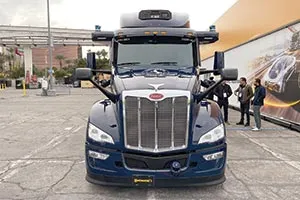
Seth Clevenger/Transport Topics
Aurora
Website: aurora.tech
Nasdaq: AUR
Founded: 2017
Executive leadership:
Chris Urmson, co-founder, chairman and CEO
Sterling Anderson, co-founder and chief product officer
Drew Bagnell, co-founder and chief scientist
Ossa Fisher, president
David Maday, chief financial officer
Locations:
Headquarters in Pittsburgh with offices in Mountain View, Calif.; Coppell, Texas; Bozeman, Mont.; Seattle; Louisville, Colo.; and Wixom, Mich.
Industry partners:
Paccar Inc. (Kenworth and Peterbilt), Volvo Trucks North America, Continental, Ryder System
Fleet and 3PL partners:
FedEx Corp., Schneider, Werner Enterprises, Uber Freight, Hirschbach, Covenant Logistics Group
Aurora Innovation is preparing to launch an autonomous driving system that will enable driverless Class 8 tractors to haul freight on designated routes, starting with terminal-to-terminal runs.
The company is targeting a commercial launch for its Aurora Horizon autonomous trucking service by the end of 2024 with about 20 unmanned trucks operating on an initial lane on Interstate 45 between Dallas and Houston. Aurora has partnered with global supplier Continental to mass produce the hardware components of the Aurora Driver, with production slated to ramp up in 2027.
The company also is applying its technology to passenger cars for robotaxi services through its Aurora Connect business.
Last year Aurora announced $820 million in new public and private funding to support the launch of its autonomous driving technology.
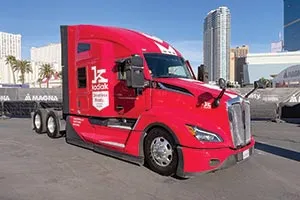
Seth Clevenger/Transport Topics
Kodiak Robotics
Website: kodiak.ai
Founded: 2018
Executive leadership:
Don Burnette, founder and CEO
James Reed, chief operating officer
Eric Chow, chief financial officer
Gerhard Eschelbeck, chief information security officer
Michael Wiesinger, vice president of commercialization
Locations:
Headquarters in Mountain View, Calif., with a testing and operations facility in the Dallas-Fort Worth area and truck ports at a Ryder System facility in Houston and a Pilot Co. travel center in Villa Rica, Ga.
Fleet, 3PL and shipper deployment partners:
Loadsmith, Maersk, 10 Roads Express, Werner Enterprises, C.R. England, Tyson Foods, Ikea, Ceva Logistics, Forward
Other industry partners:
Ryder System, Pilot Co.
Kodiak is developing autonomous driving technology to enable Class 8 tractors to operate without a driver on designated hub-to-hub routes.
The company plans to launch its first driverless operations later this year on Interstate 45 between Dallas and Houston.
In January, Kodiak debuted its “driverless-ready” sixth-generation self-driving truck with redundant braking, steering and power systems to ensure safe operation without a human driver.
Kodiak also is applying its autonomous driving system, the Kodiak Driver, to military vehicles for the U.S. Department of Defense.
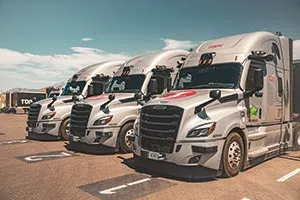
Torc Robotics
Torc Robotics
Website: torc.ai
Founded: 2005; acquired by Daimler Truck in 2019
Executive leadership:
Peter Vaughan Schmidt, CEO
Andrew Culhane, chief strategy officer
Marnie Young, chief people officer
C.J. King, chief engineering officer
Michelle Chaka, senior vice president, safety and regulatory
Locations:
Headquarters in Blacksburg, Va., with a test facility in Albuquerque, N.M., and engineering offices in Austin, Texas; Stuttgart, Germany; and Montreal
Fleet pilots:
Schneider, C.R. England
Industry advisers:
Uber Freight, C.H. Robinson, Covenant Logistics, Penske Truck Leasing, Ryder System Inc., Schneider, Daimler Truck North America
Torc Robotics, an independent subsidiary of Daimler Truck, is developing an autonomous driving system designed to enable unmanned Class 8 trucks to travel between designated hubs on interstate highway routes.
The company is targeting a 2027 market launch for its autonomous driving technology, which will be installed on modified Freightliner Cascadia models with redundant safety systems to support driverless operation.
Torc plans to prove the economic viability of its technology by removing the safety driver on an initial freight lane in Texas between Laredo and Dallas.
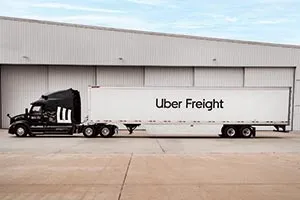
Waabi
Waabi
Website: waabi.ai
Founded: 2021
Executive leadership:
Raquel Urtasun, founder and CEO
Dustin Koehl, head of commercialization
Eyal Cohen, head of hardware
Daryn Nakhuda, head of software
Sam Loesche, head of policy and public affairs
Nandini Maheshwari, head of corporate development and strategy
Jur van den Berg, principal software engineer
Locations:
Headquarters in Toronto with U.S. headquarters in San Francisco
Industry partnership:
Uber Freight
Waabi is developing autonomous driving technology for heavy-duty trucks to operate without a driver, starting with hub-to-hub freight lanes.
The company’s development approach focuses on simulation to reduce the need for on-road testing and artificial intelligence to improve the adaptability of its autonomous driving system, the Waabi Driver.
In September, Waabi announced a partnership with third-party logistics provider Uber Freight to provide carriers with services and technology to support deployment of autonomous trucks in their fleets in the future. At this stage, Waabi has begun transporting commercial loads on the Uber Freight network, starting with regular runs between Dallas and Houston with plans to expand to other lanes in Texas and beyond.
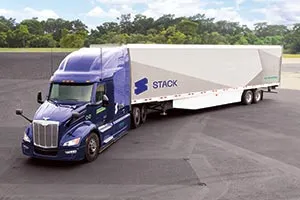
Stack AV
Stack AV
Website: stackav.com
Founded: 2023
Executive leadership:
Bryan Salesky, co-founder and CEO
Peter Rander, co-founder and president
Brett Browning, co-founder and chief technology officer
Location:
Headquarters in Pittsburgh
Stack AV is developing autonomous driving technology for on-highway Class 8 trucks.
The company, which publicly launched in September, has provided few details on its targeted business model or deployment plans as of early February.
The business is backed by investment holding firm SoftBank Group Corp. and was started by the founders of autonomous driving firm Argo AI, which closed in 2022.
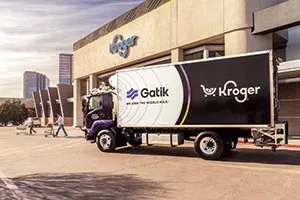
Gatik
Gatik
Website: gatik.ai
Founded: 2017
Executive leadership:
Gautam Narang, co-founder and CEO
Arjun Narang, co-founder and chief technology officer
Apeksha Kumavat, co-founder and chief engineer
Locations:
Headquarters in Palo Alto, Calif., and locations in Toronto; Bentonville, Ark.; and Fort Worth, Texas
Industry partners:
Isuzu North America Corp., Cummins Inc., Ryder System Inc., Goodyear, ChargePoint
Commercial partners:
Walmart Inc., Loblaw Cos., Pitney Bowes, Georgia-Pacific, KBX, Kroger, Tyson Foods
Gatik is deploying autonomous light- and medium-duty box trucks in shorthaul operations in urban, semi-urban and highway environments. The company’s self-driving vehicles transport goods on “middle-mile” routes between distribution centers, fulfillment centers and retail stores.
Gatik began fully driverless commercial deliveries for Walmart in Bentonville, Ark., in 2021 and for Canadian grocer Loblaw Cos. in Ontario in 2022. The company plans to deploy unmanned medium-duty trucks in Texas by the end of 2024.
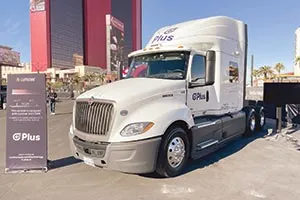
Seth Clevenger/Transport Topics
Plus
Website: plus.ai
Founded: 2016
Executive leadership:
David Liu, co-founder and CEO
Shawn Kerrigan, co-founder and chief operating officer
Hao Zheng, co-founder and chief technology officer
Tim Daly, co-founder and chief architect
Wiley Deck, vice president of government affairs and public policy
Locations:
Headquartered in Santa Clara, Calif., with operations in the United States, Europe and Australia
Industry partners:
Nikola Corp., Iveco, Cummins Inc., Bosch, Transurban
Fleet pilots:
Amazon.com Inc., DSV
Plus has introduced an open software platform designed to support a range of driver-assist and autonomous driving capabilities across different sensor hardware, powertrains and vehicle models.
The company’s PlusDrive advanced driver-assist system automates acceleration, braking and steering during highway driving but still requires the driver to actively monitor the system. Hydrogen fuel cell truck maker Nikola Corp. plans to offer PlusDrive on its vehicles in the U.S. market by the end of 2024. Plus also is developing SuperDrive, a fully autonomous driving system for driverless vehicles.
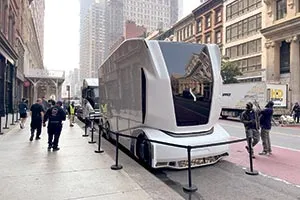
Seth Clevenger/Transport Topics
Einride
Website: einride.tech
Founded: 2016
Executive leadership:
Robert Falck, founder and CEO
Linnea Kornehed Falck, founder and deputy CEO
Filip Lilja, founder and vice president of special projects
Niklas Reinedahl, general manager for North America
Henrik Green, general manager of autonomous technologies
Locations:
Headquartered in Stockholm, with offices in Gothenburg, Sweden; New York; Austin, Texas; and Berlin
Fleet and shipper partnerships:
GE Appliances, DB Schenker, Bridgestone Americas, Electrolux, Lidl, Mars, AB InBev, Maersk, Heineken
Einride is deploying unmanned, electric-powered delivery vehicles designed to haul cargo within industrial sites and on public roads. These autonomous electric transport vehicles, which have no cab, driver’s seat or steering wheel, are monitored by remote operators.
Last year, Einride began transporting goods autonomously on a regular basis for GE Appliances at a private site in Selmer, Tenn.
The company also is deploying manned battery-electric Class 8 tractors to support fleet electrification.
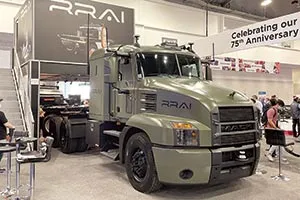
Seth Clevenger/Transport Topics
Forterra
Website: forterra.com
Founded: 2002
Executive leadership:
Alberto Lacaze, founder, chairman and president
Josh Araujo, CEO
Scott Sanders, chief growth officer
Joseph Putney, chief technology officer
Location:
Headquartered in Clarksburg, Md.
Forterra, formerly known as Robotic Research Autonomous Industries, or RRAI, has developed autonomous driving and driver-assist technology for on-road and off-road vehicles.
Building on its work on automated military vehicles for the U.S. Department of Defense, the company is applying its self-driving system, AutoDrive, to heavy-duty trucks, terminal tractors and transit buses. Use cases for Forterra’s automated truck technology include highway transportation, yard moves and rugged-terrain applications, such as mining, logging and construction.
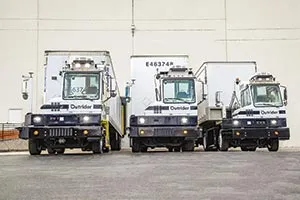
Outrider
Outrider
Website: outrider.ai
Founded: 2017
Executive leadership:
Andrew Smith, founder and CEO
Ira Renfrew, chief product officer
Joe Welsh, chief commercial officer
Londonne Corder, chief marketing officer
Locations:
Headquarters and a dedicated testing facility in Brighton, Colo.
Industry partners:
Orange EV, Rite-Hite
Customers:
Outrider said it is working with customers who represent more than 20% of all yard trucks in operation in North America. Georgia-Pacific has deployed Outrider’s system in daily operations at a distribution center in the Chicago area.
Outrider is developing technology to enable autonomous yard operations at logistics hubs and distribution centers.
The company’s unmanned, electric-powered yard trucks autonomously move trailers to and from loading docks and parking spots. The Outrider system hitches and unhitches trailers, robotically connects and disconnects trailer brake lines and integrates with supply chain management systems.
Outrider is planning to commercially launch its technology in the fourth quarter of 2024.
The company has raised $191 million in financing to date, including a $73 million round closed in January 2023.
Want more news? Listen to today's daily briefing below or go here for more info:





